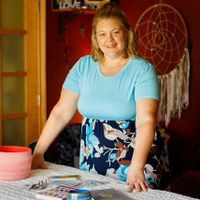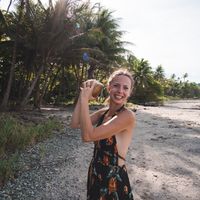Embarking on my healing journey, it became clear that wellness often emerges from the unexpected challenges we face. My life, once defined by how much I could do for others, didn't leave much space for my own needs. I was the go-to person for support, always ready to lend a hand or an ear, often at the expense of my own well-being. This way of living, I realized, was unsustainable, especially when faced with a health crisis that demanded I shift focus back onto myself.
From a young age, I had internalized the belief that love and validation came from being indispensable to others. This deeply ingrained notion guided much of my behavior, leading me to consistently put the needs of others ahead of my own. The timing of my diagnosis was telling, arriving at a moment when I was considering my options to move away from a job that had become a steady source of stress and unhappiness. My body had been sending out warning signs for a while, but the diagnosis of rheumatoid arthritis and lupus antibodies truly highlighted the severity of my condition.
One morning, I found myself immobilized, unable to move my neck, followed by swelling in my hands, knees, and ankles that rendered me nearly incapacitated. By the time I finally saw a doctor a few months later, the situation had escalated drastically. I could barely walk, close my hands, or even brush my hair. This illness, though initially perceived as a curse, became my greatest teacher, forcing me to confront the necessity of self-care and the importance of listening to my body.
Navigating the traditional medical system presented several obstacles, especially when it came to rheumatologists who were quick to prescribe medications without looking into the root cause of my condition. Treatments like methotrexate and prednisone did offer temporary relief, but they brought along severe side effects, such as clinical depression and noticeable hair loss. This experience made it clear that I needed a more integrated approach to healing—one that didn't rely solely on pharmaceuticals.
Amidst the challenges brought on by the pandemic, I found a pillar of support in my current therapist, skilled in integrating humanistic, somatic, and metacognitive therapies. It was during this turbulent period that I learned the value of stillness and acquired effective methods to confront my anger and depression. The enforced isolation and global slowdown offered me a rare opportunity for deep rest and reflection, a stark contrast to the relentless pace of my previous life. This time allowed me to embrace rest not just as a temporary measure but as a vital component of my healing. Watching "The Big Bang Theory" on repeat and scrolling through TikTok became more than just leisure activities; they were part of my therapy, my body's way of healing through relaxation and laughter. It was a lesson of listening to what I truly needed, which in this case was as simple as giving myself permission to do nothing at all.
A critical turning point in my healing journey came when I decided to reassess my relationships, stepping back from those who sought out my company only when it suited them. This decision, though painful, was empowering, marking the first step toward establishing boundaries that prioritized my well-being. The emotional labor I had been expending in the service of others had left little room for my own healing. It was only by confronting this imbalance that I began to experience tangible improvements in my health, including the remarkable disappearance of lupus antibodies from my system.
This shift in focus from outward to inward - from others to myself, was not just about setting physical boundaries but also about acknowledging and addressing the deep-seated emotional challenges that had contributed to my autoimmune condition in the first place. Recent research has highlighted the intricate connection between trauma and autoimmune conditions. Studies suggest that traumatic experiences can trigger an immune response in the body, leading to chronic inflammation and autoimmune disorders. This correlation underscores the importance of addressing emotional burdens alongside physical symptoms in order to truly heal.
Through this process, I learned that the future of my health and wellness depended on letting go of the past, just as much as it relied on the physical treatment of symptoms. The exploration of holistic therapies, particularly Emotional Freedom Technique (EFT) and Reiki, offered new avenues for healing. EFT, with its focus on tapping meridian points to release emotional blockages, provided a means of vocalizing and processing deep-seated pain. Reiki, introduced to me by a mentor, facilitated a much-needed shift in my energy and perspective, enabling me to view my experiences through a lens of growth rather than victimhood.
These practices did not just help alleviate my symptoms; they addressed the underlying trauma that had manifested physically in my body. It was through these holistic healing therapies that I was able to locate the root of the behavior that was affecting me: my biological father's early departure from my life and my anxiety that one day my mother would leave too led me to subconsciously serve others constantly, trying to prove I wasn't a burden by ignoring my own needs. I believed that by constantly serving others, they would see me as worthy of staying for - that they wouldn’t leave. I learned that this is a common trauma response for individuals who experience abandonment.
As I explored alternative therapies and adjusted my lifestyle, my health began to improve significantly. Not only did I become more in tune with my body's needs, but I also saw a reduction in the symptoms of my autoimmune disease. Over time, with consistent practice of somatic exercises, mindfulness, and dietary changes, my dependence on medication decreased. Most notably, my latest tests showed a remarkable improvement: the once prevalent lupus antibodies were no longer detectable and I have had test results for periods indicating a huge reduction in my inflammatory markers. This turn of events confirmed my belief in the body's inherent ability to heal, given the right conditions and support but rheumatoid arthritis (RA) is still my biggest teacher. When the flares do come, I know they are another lesson waiting to be understood and another healing opportunity waiting to be explored. Moving forward, I intend to incorporate phases of autophagy through fasting, a strategy aimed at enabling my body to decompose and repurpose old cells. While I'm uncertain of the outcome, my resolve is firm to persist in experimenting with holistic approaches until I achieve remission of my RA.
Today, my life is vastly different from how it was before my health challenges began. The transformation from a place of struggle to one of enlightenment has enriched my relationships and given me a newfound sense of direction. I've cultivated deeper, more genuine connections with an amazing partner, friends who support me unconditionally, and with peers who share my aspirations. Financial worries have faded into the background, allowing me to focus on what truly matters. Most importantly, I've created a sanctuary within myself, a safe space where I can weather any storm with confidence. In my work, I draw from this personal growth, guiding others through their healing journeys with energy work that aims to move, transform, and clear blockages. My practice is a testament to the power of embracing self-love and making one’s well-being a top priority.
By sharing my experience, I aim to encourage others to see the value in taking care of themselves and to understand that healing is possible for everyone. While the path to wellness can be challenging, it also offers countless opportunities for personal development and positive change. Learning from my own healing journey, I've found that acknowledging our struggles and focusing on our recovery can lead us to a place where true health and fulfillment are not just dreams, but achievable outcomes.













